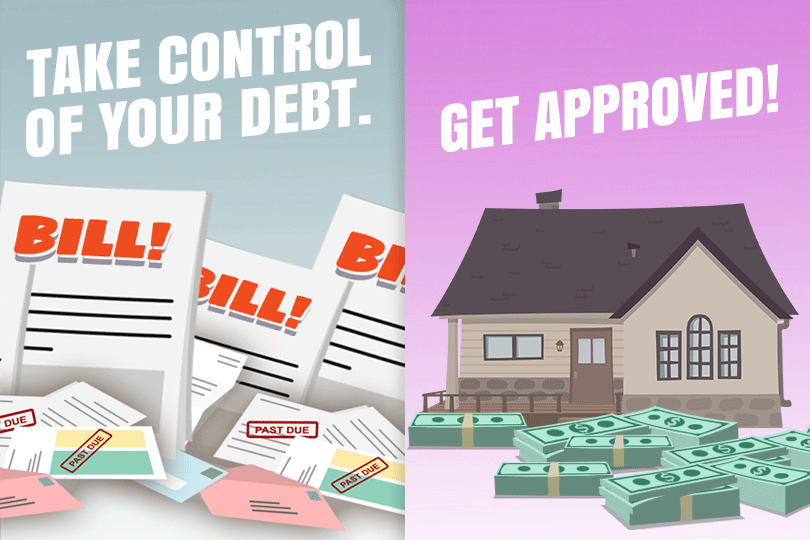Getting Approved for an FHA Loan
June 8, 2021
Credit Scores and Down Payments
The lower credit score and down payment requirement is one of the prime features that draws borrowers to apply for an FHA loan. The FHA stipulates that borrowers with a FICO score of at least 580 are eligible for the low- down payment minimum of 3.5% down payment. Those with scores between 500 and 579 must pay at least 10% for the down payment, which is still less than the usual 20% minimum for most conventional loans with no private mortgage insurance.
Mortgage Insurance Premiums
To help protect lenders from the losses in the case of borrowers defaulting on their loans, while continuing to offer high-risk borrowers flexible home loans, the FHA requires that all borrowers pay a Mortgage Insurance Premium (MIP). MIP is paid monthly, along with the monthly mortgage payments. Borrowers are also required to pay a one-time, Upfront Mortgage Insurance Premium (UFMIP) at closing, which is usually 1.75% of the loan amount. The annual MIP cost depends on the length of the loan, the loan-to-value ratio, and when the loan was originated. It’s important that borrowers know about this added cost before applying, so they don’t face any unexpected surprises later on.
Debt-to-Income Ratio
While the FHA has no minimum income requirement, it sets a maximum debt-to-income ratio to determine whether borrowers have sufficient funds to keep up with monthly payments. According to HUD Handbook 4000.1, FHA borrowers can have a “maximum qualifying ratio” 43%. This is calculated by adding up the total mortgage payment for the new home, as well as any recurring monthly debt. This includes principal and interest, escrow deposits for taxes, hazard insurance, mortgage insurance premium, as well as car loans, personal loans, student loans, credit cards, etc. That number is divided by the borrower’s gross monthly income. The result should fall under 43% to qualify for an FHA loan.
FHA Limits
The FHA has a maximum loan amount that it will insure. These limits vary by county and property type, and are updated every year based on conventional loan limits set by Fannie Mae and Freddie Mac. This limit that borrowers fall under is a huge determining factor in not just their home choice, but also if they decide to get an FHA mortgage.
Property Types
It may surprise many borrowers to learn that the FHA insures loans to purchase many different property types, and there are specific programs to suit those needs. The FHA offers Condo Loans, One-Time Construction Loans for new construction, and also Rehab Loans for fixer-uppers. The main rule to know is that any home purchased with an FHA loan must serve as the borrower’s primary residence. Investment properties are not eligible. There are exceptions for mixed-use properties, with at least 51% of the space dedicated to residence.
If you are interested in applying for an FHA loan, talk to your loan officer to see if you meet all the requirements, and figure out if it is the best option for you!
------------------------------
RELATED VIDEOS:
Understand the Reasons for Private Mortgage Insurance
Carefully Read Your Closing Disclosure
Buying a Home With a Co-Borrower

FHA Loan Articles
January 15, 2025Buying a condo with an FHA loan is an option some don’t consider initially, but it’s worth adding to your list of potential property types. FHA loans for condo units traditionally require condo projects to be on or added to the FHA-approved list. Still, changes in policy over the years allow borrowers to apply for FHA loans on condo units in projects not on the list on a case-by-case basis.
December 30, 2024When applying for an FHA loan, lenders will consider more than just your credit scores and history. They also look at other factors affecting your risk profile and the interest rate they offer you.
One factor is occupancy type. For FHA loans, this is straightforward because these loans require owner occupancy. Investment properties aren't eligible. While conventional loans may have different rates for primary residences, second homes, and investment properties, this isn't a concern with FHA loans.
December 18, 2024Did holiday spending get the better of you? Are you looking for ways to recover your spending plan as you search for a new home?
The holidays are a whirlwind of festivities, family gatherings, and gift-giving. But amidst the cheer, it's easy to lose track of spending. If you're aiming to buy a home in the near future, those extra expenses can have a bigger impact than you might realize, especially if you're considering an FHA loan.
December 17, 2024The Federal Housing Administration provides mortgage insurance on loans made by FHA-approved lenders, making homeownership more attainable for those who might not qualify for conventional loans.
While financial factors like credit score and debt-to-income ratio are key to loan approval, other non-financial aspects can also cause a denial.
December 11, 2024FHA loans, insured by the Federal Housing Administration, are a popular choice for many homebuyers, especially those who need a lower downpayment or more forgiving credit qualifying requirements. FHA loans are primarily intended for primary residences—homes that borrowers will occupy as their main dwelling.







